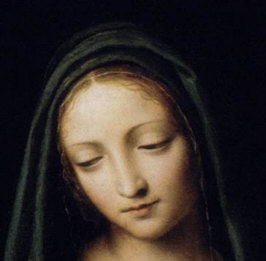Maryam’s Song, The Revolutions Of God And The Jihad Of Jesus.

Mary’s Message For Christians And Muslims.
Dave Andrews
In the Qur’an it says ‘to Maryam the angels said: “Maryam, God gives you glad news of a Word from him” concerning her “son”, the “Masih – or Messiah – Isa” (3.45)’. And ‘Maryam said “Lord how shall I have a child, when no man has touched me?” He said “It will be so. God creates whatever He wills. To have anything done, He only says to it, ‘Be!’ and it is.”(3.47) So Isa, who ‘was “born of a virgin”, and, uniquely, a “sign” – with which his mother (Maryam) is necessarily linked – takes pride of place in Islam…with Adam alone whose genesis was likewise by the divine: ”Kun fyakun – ‘Be!’ And it is”.’(3.59)
But who really believes in a virgin birth? According to the Qur’an, certainly those in Maryam’s family didn’t. In the Qur’an it says that when Maryam ‘became pregnant’ she ‘withdrew to remote place’ (19.22) and ‘when she brought the child in her arms to her family’, the members of her own family vehemently and violently reprimanded her, saying, “Maryam! For shame! Whatever have you done? O sister of Aaron, your father was not a womaniser, and your mother was not a whore!”(19.27,28) However, according to the Injil, Joseph stood by Maryam and sheltered both mother and son.
In the Qur’an, Maryam – or Mary – is greatly venerated. Maryam ‘grew into a goodly child’ nurtured in ‘the care of Zachariah’ (3.37), who grew into a ‘woman of truth’, who was ‘pure’(3.42), ‘obedient’(3.43), and ‘never unchaste’(19.20 ). Maryam sought to live her life ‘in the refuge of the All-Merciful’(19.18), One whom she could trust completely, to meet all her needs, saying ‘God gives without stint to whoever He wills.’(3.37) So when the Qur’an refers to Isa – or Jesus – repeatedly as ‘Ibn Maryam’ – the ‘Son of Mary’ – it is showing great reverence for her son and for his mission.
In the Gospel Of Luke, Maryam is said to have sung a song of praise that reflected her deep, profound, personal faith in God and revealed her joyous and jubilant appreciation of his great faithfulness to her as a person. She sang: ‘My soul praises the Lord and my spirit rejoices in God, my Saviour, for he has been mindful of the humble state of his servant. From now on all generations will call me blessed, for the Mighty One has done great things for me – holy is His Name. His mercy extends to those who fear Him, from generation to generation.’ (Luke 1.46-50)
Maryam celebrated her experience of God as a God of justice, who has overthrown the rich and the powerful and upheld the poor and the powerless. She sang: ‘He has performed mighty deeds with His arm; He has scattered those who are proud in the plans of their hearts. He has brought down the mighty from their thrones, but has lifted up the humble. He has filled the hungry with good things, but has sent the rich away empty. He has helped His servant Israel, remembering to be merciful to Abra-ham and his descendants forever, even as He said to our fathers.’ (Luke 1:51–56)
Maryam’s Song has been described by Stanley Jones as ‘the most revolutionary document in the world’. William Barclay states that the song ‘speaks of the three revolutions of God’ – a moral revolution, a social revolution, and an economic revolution.
Maryam says God starts with the moral revolution: ‘He has scattered those who are proud in the plans of their hearts’. And, when he began his mission, her son Isa advocated a moral revolution. ‘Unless your righteousness surpasses that of the teachers of the law, you will not enter the kingdom of heaven.’(Matthew.5.20)
Maryam says God starts out with a moral revolution and continues on as a social revolution: ‘He has brought down the mighty from their thrones, but has lifted up the humble’. And when he carried out his mission her son Isa accentuated a social revolution. One day Isa sat down with his twelve disciples and he said to them, ‘Anyone who wants to be first must be the very last, and the servant of all’. (Mark 9.35) Isa insisted on this, he said, because ‘it is the one who is least among you all who is the greatest.’ (Luke 9.48)
Maryam says God starts out with a moral revolution, continues on as a social revolution and concludes as an economic revolution: ‘He has filled the hungry with good things, but has sent the rich away empty.’ And, when he realised his mission, her son Isa articulated it as an economic revolution. Isa said to his disciples, ‘Blessed are you who are poor, for yours is the kingdom of God. Blessed are you who hunger now, for you will be satisfied. But, woe to you who are rich, for you have already received your comfort. Woe to you who are well fed now, for you will go hungry.’ (Luke 6.20-21,24-25)
The struggle to incarnate ‘the revolutions of God’ is ‘the jihad of Jesus’ – and of all who follow him.
Order ‘The Jihad of Jesus’ in Oz http://bit.ly/1GumEsu from OS http://amzn.to/1IUEtj4 Kindle http://bitly.com/1HLsSDo



